Text
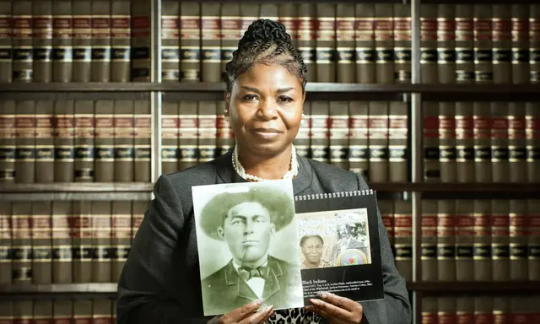
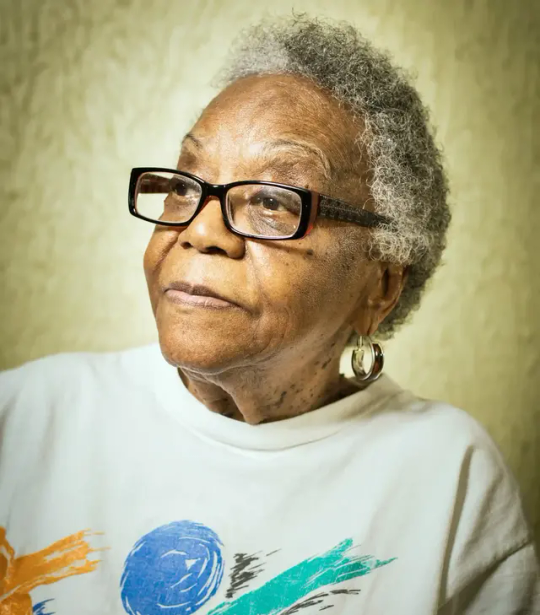
Image #1
Rhonda Grayson, with an image of her great-great grandfather Willie Cohee.
Image #2
Johnnie Mae Austin, whose grandfather was ‘Creek to the bone,’ is a plaintiff in the Creek Freedmen suit. Photograph: Brett Deering/The Guardian
Suing to Reclaim Identity... Is this Action?
The Facts
The ability to sue a nation that has deprived them of connection to their identity is a great source to call for action. Black Native Americans who were apart of the Creek Nation are almost never allowed to join this tribe due the constitution made in 1979. The tribe made this constitution to prevent them from joining. The tribe actually took a vote to "reconstitute citizenship parameters", this kicked out black people who have been members since 1866. The citizenship was limited to the blood quantum which I have talked about in previous posts (Having to have a certain amount of blood to be required Native American). This case for Johnnie Mae Austin to prove her lineage of creek blood which can be found in the "Creek Freedman list of the Dawes roll" still is hindered based upon the perception that there still is not enough Native American blood. The Creek Nation has stated they are a "independent agency", Austin's attorney is sure they have to follow the law just as anyone else. This case may end similar as the lost taken by the Seminole tribes for this case problem.
Highlights from the Stories
"Johnnie Mae Austin and her grandson, Damario Solomon-Simmons, can tell you everything about their ancestry. They can go back as far as 1810, the year Solomon-Simmons’ great-great-great-great-grandfather, Cow Tom, was born. With undeniable pride, they recount the man’s feats of bravery during the civil war, and his leadership within Oklahoma’s Creek population."
"In fact, they are so determined to let the world know exactly who Cow Tom was that they’re suing the Creek nation to make sure his descendants aren’t forgotten."
"Roberts says the actual disenfranchisement of black people by the Creeks and the Cherokee started in the late 20th century coincided with a time when a lot of the tribes had begun to build their economies and make a lot of money. She points out this was precisely the time when many of the Nations started to see an “influx of enrollment applications”.
"The current Creek principal chief, Jamie Floyd, declined to comment, and his press officers referred me to the nation’s citizenship office led by Nathan Wilson. “We’re an independent agency constitutionally and we’re listed in the Constitution as independent,” Wilson told me."
"But the vagueness of the nation’s response shouldn’t be read as a dismissal of the importance of the citizenship issue. In fact, the Creek nation is lawyering up. Venable LLP, a top Washington DC law firm, contacted Solomon-Simmons in August on behalf of the Creek nation. Both the Creek nation and the interior department have filed motions to dismiss on 5 October and the court will respond on 2 November."
Read Entire Story Here
1 note
·
View note
Text

Darnella Davis, center, with her siblings and their parents, John and Mary, in 1955. Mary was Muscogee Creek, and John said he had Cherokee blood; a grandfather received a land allotment for Native Americans. But Darnella’s Indian heritage was later disputed. (University of New Mexico Press; courtesy of Lafayette West
Darnella Davis always knew her heritage, she always knew who she was, she was afraid to express her identity out of fear that her black neighbors would judge her. Darnella Davis family were from Oklahoma, they were not use to the fleeing from racial discrimination of sharecropping to make a living in the Deep South. Although Darnella Davis knew her true identity from lived experiences with her grandfather, she accounts memories of driving to ancestral grounds, and her mom being called "Poachontas". She truly believed she would be able to use her Native American identity to qualify for scholarships which she was denied by the Cherokee Nation and the State of Massachusetts. The reoccurring stories of being denied their race, their power, their identity, and their voice emphasizes the importance for a need for a call for action to combat narratives eradicating Black Native Americans existence.
Read More at
https://www.washingtonpost.com/outlook/a-mixed-race-womans-long-quest-to-prove-her-native-american-ancestry/2019/01/04/4f2ada42-0c6d-11e9-831f-3aa2c2be4cbd_story.html
0 notes
Text
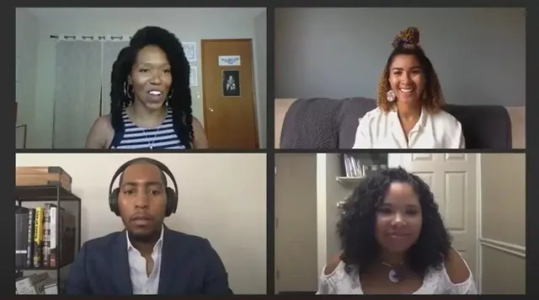
Four activists speak during a panel discussion hosted by the Smithsonian National Museum of the American Indian on Indigenous Peoples' Day. Clockwise, from top left: Amber Starks, Joy SpearChief-Morris, Autumn Rose Williams and Kyle T. Mays.
More Empowerment?
Furthering the discussion on Empowerment, I would like to highlight another Black Indigenous Woman's story, Autumn Rose Williams,
"For Autumn Rose Williams, a Black member of Shinnecock Indian Nation, being an African American Native woman is foundational to her sense of pride and empowerment, she said."
The Power of identity is. "within you, between you an yourself". Whatever is for you is for you regardless of what the world says against you.
Reason for Call for Action
Black Native American's grew up differently. Some grew up on reservations, some have had ancestors to fight for their freedom from slavery, and there is even some who aren't aware of their family history. They aren't aware of the blood mixing that is secreted through having to identify as only Black. Black Native Americans are labeled regardless where they grew from. Rather it be for the tribal clothes they wear, jewelry, or even their hair it all still affects the labels carried by them.
Call for Action
SpearChief-Morris said that it's often seen as taboo to acknowledge the racism that exists both ways between Black and Indigenous people.
"We ignore the history of past experience and past strength in solidarity movements," she said. "There is the Red Power movement and the civil rights movement that went hand-in-hand with each other in the United States and that both groups supported each other."
Black Indigenous Women's voices and wisdom towards the rest of their race is important, it is exciting to see women's voices advocating for change.
It is time to ignore the past, the laws that were forced to divide these two cultures. It is time to break away from forcing identity on people. The system is set up to oppress people of color, it is time to work against the system. It is time to fight the system for creating the traumas faced by people of color by women.
Read More at
0 notes
Text
Image #1
Roicia Banks at the Arizona Capitol, on the day she spoke at the Women's March in Phoenix in January 2017.
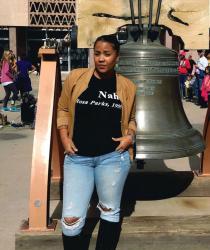
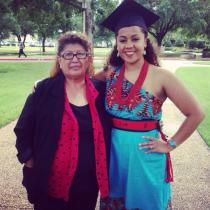
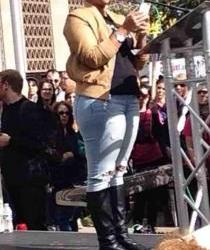
Image #2
Roicia Banks with her mom on the day she graduated from her master's program. Today Banks is confident in her self-identity, proudly African-American and Native American
Image #3
Roicia Banks speaking at the Women's March in Phoenix in January 2017.
Why Empowerment?
Empowerment is essential to the existence of Native Americans. Power was removed from Native Americans and Africans, their identity has attempted to be erased from history, eradicated to the point where people question if their population is still alive. Empowerment provides a voice for Black indigenous People against racial discrimination that happens even throughout the reservations. Black Native American's life is almost primarily dedicated to proving their identity, proving they have enough Native American. The attendance to ceremonies, attempt to adjust to customs, and still having to prove they are supposed to be apart of the tribe is every reason for empowerment. Empowerment is important to show there isn't anything unusual about the mixing of the races, Black Native Americans have existed since the start of the United States.
Facts-
"In her high school, there were a couple younger girls who were also black and Native American. And she said they became inseparable, because they understood what living that reality meant."
“We had all suffered some sort of racial discrimination on our native American side that We’re all able to say, ‘Oh that happened to me, too,’" she said. "Like the teasing, the bantering, the hair the scrubbing your skin raw because you want it to be lighter"
Read More About the Importance of Empowerment
0 notes
Text
Telling The Story:
As the past progressed, the yearn to identify Black Native Americans grows. Black Indigenous Women deserve a voice of empowerment, their voice should carry power that extends beyond the perceived racial discrimination.
"Tasha Spillett, who identifies as urban Afro-Indigenous with family ties to Opaskwayak Cree Nation and Cumberland House Cree Nation, said as an author her words carry the responsibility of her people and she uses her words for their empowerment."
Black Native American women focus their aims on gaining identification of respect towards their culture. Black Indigenous women spread their culture through action. Black Indigenous use their voices as power. Their voices serve as their guidance point to destroy the perceived notions about them
"Spillett said she's working on a young adult novel about the Afro-Indigenous experience. She wants to explore how Afro-Indigenous people are treated during the "pretendian" exposes in recent years."
Black Indigenous women and people are denied their culture because they do not appear the same, as previously mentioned the power of their voices is what makes these women strong.
0 notes
Text
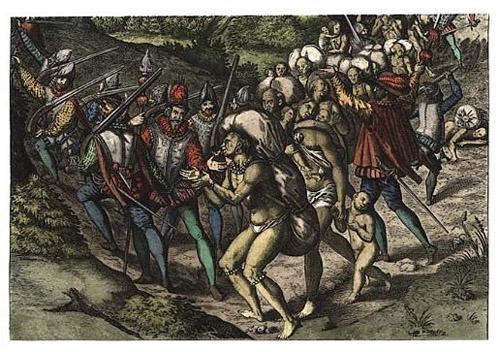
Engraving of Spaniards enslaving Native Americans by Theodor de Bry (1528–1598), published in America. part 6. Frankfurt, 1596
What Happened?
In the beginning colonists enslaved African and Native American people. Native Americans were enslaved before African people arrived to the United States. Eventually the arrival of African slaves caused the development of relationship, a kinship, between these two cultures. They grew to have children together creating the Black Indigenous race. African and Native American people produce intermarriage.
In the beginning Black Native Americans were created through enslavement as time progressed some Native American populations decided to enslave Africans. Children that came from intermarriage of Black and Native American people were considered illegitimate. There wasn't enough Native American blood to address that as their identity.
The Facts?
"As early as 1708, the slave population of South Carolina, a colony that benefited from fully conceived practices of slavery in Barbados, had an enslaved population of 2,900 African descended slaves and 1,400 Native American slaves"
"In Charleston, South Carolina, slave traders could purchase both African and Native American slaves; however, these experiences were not merely documented in the annals of history, periodicals, and scientific analysis."
Interested in Reading More?
10 notes
·
View notes
Text

Although the location and identity of this young woman cannot be traced, the existence of Black Indigenous People is a culture that needs revival. Black Native Americans disappeared due to their race. Black Native Americans were denied opportunities presented to the Native Americans because they did not contain enough Native American. African and Native American people grew together through enslavement. Africans and Native Americans were often transported together in the slave trade until Native Americans enslaved Africans.
Read More Here: https://theokeagle.com/2019/07/02/98-of-african-americans-are-in-fact-native-indians-and-are-owed-millions/
5 notes
·
View notes